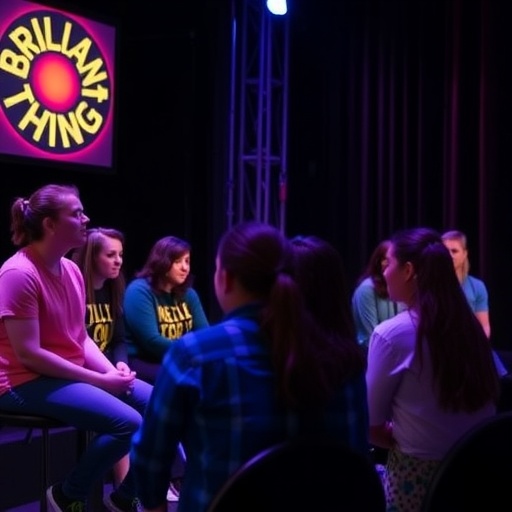In recent years, the intersection of performing arts and mental health interventions has garnered increasing attention within academic and clinical communities alike. A groundbreaking study emerging from the United States now highlights the profound impact of an interactive theatrical production titled “Every Brilliant Thing” on reducing suicide-associated stigma among university students. This innovative one-person play, which recently made its debut on the West End, strategically interweaves narrative storytelling and audience engagement to address suicidality with sensitivity and nuance, showcasing the potential of arts-based approaches in mental health advocacy.
The study conducted a rigorous three-time point assessment to evaluate the efficacy of “Every Brilliant Thing” in diminishing negative perceptions and internalized stigma related to suicide among young adults within a campus environment. Participants who attended the live performance demonstrated a marked decrease in stigmatizing attitudes immediately following the intervention, with these positive effects persisting for up to 30 days post-performance. This enduring impact underscores the sustainability of arts-driven mental health strategies in fostering empathetic understanding and promoting help-seeking behaviors.
“Every Brilliant Thing” distinguishes itself through its interactive format, allowing audience members to play an active role in the storytelling process. This participatory element transforms passive spectatorship into a shared experiential journey, facilitating deeper emotional engagement and reflection. The play’s central theme revolves around a list of reasons to live, compellingly articulated by actor Saleemah Sharpe during live performances. This approach reframes suicidality from a taboo and isolating topic into one of collective hope, resilience, and connection.
The implications of the study extend beyond theatrical innovation, pointing towards a broader paradigm shift in public health interventions. Traditional suicide prevention programs often rely heavily on didactic or clinical methods, which, while effective, may lack the emotional resonance needed to penetrate stigma deeply embedded in cultural and social norms. The theatre medium, with its capacity for empathy and narrative immersion, offers an experiential alternative that can complement conventional strategies and reach audiences who might otherwise remain disengaged.
Methodologically, the research utilized validated psychological scales to assess stigma associated with suicide before, immediately after, and one month following the intervention. This longitudinal design provides robust evidence for the durability of attitudinal changes prompted by the performance. Additionally, qualitative feedback collected from audience members revealed heightened awareness about the complexities of suicidality and a greater willingness to engage in conversations about mental health, indicating broader psychosocial benefits.
Furthermore, the study’s implementation in a university setting is particularly notable. College campuses are critical arenas for mental health initiatives given the elevated risks of depression, anxiety, and suicidal ideation among young adults. By embedding “Every Brilliant Thing” within this context, the intervention demonstrates relevance and accessibility to a demographic often resistant to traditional mental health outreach. The play’s interactive nature effectively breaks down barriers, fostering a safe space for dialogue and emotional processing.
The creative team behind this production leveraged theatrical techniques such as direct audience address, improvisation, and narrative fragmentation to simulate real-life unpredictability and emotional complexity. These elements create an immersive environment where participants confront challenging emotions within a controlled, supportive framework. This multidimensional approach not only enhances engagement but also facilitates cognitive and emotional processing critical for stigma reduction.
Importantly, the authors of the study reported no specific funding support and declared no competing interests, emphasizing the objectivity and scholarly integrity of their work. The research appears in PLOS Mental Health, a reputable open-access journal committed to disseminating rigorous scientific knowledge in mental health. The article’s DOI, 10.1371/journal.pmen.0000404, offers readers direct access to the full study, encouraging further exploration and replication.
The broader significance of this work lies in its contribution to the growing body of evidence advocating for interdisciplinary approaches to public health challenges. Integrating performing arts with psychological science not only enriches intervention modalities but also challenges conventional boundaries, fostering innovative collaborations between researchers, clinicians, and artists. This convergence holds promise for enhancing cultural competence and increasing the reach of mental health initiatives.
Beyond stigma reduction, “Every Brilliant Thing” potentially influences suicide prevention at multiple levels, including individual, community, and societal. By humanizing experiences of suicidality through personal narrative and inclusive storytelling, the play cultivates empathy, reduces social isolation, and encourages proactive help-seeking. These outcomes align with best practices identified by global health organizations emphasizing the importance of stigma mitigation in effective suicide prevention.
Moreover, the longevity of the intervention’s impact signals that a single exposure to thoughtfully designed arts-based programming can catalyze meaningful change, an insight with significant implications for scalability and resource allocation. Universities and community organizations might consider incorporating similar performances into their mental health education repertoires as cost-effective, high-impact tools for engagement.
In sum, the research surrounding “Every Brilliant Thing” represents a pioneering foray into harnessing the transformative power of the performing arts to address one of society’s most pressing public health issues. By blending rigorous scientific assessment with creative innovation, the study charts a promising course for future mental health interventions that are both culturally attuned and emotionally compelling. As suicide rates continue to challenge health systems globally, such interdisciplinary endeavors may prove essential in cultivating widespread understanding and compassionate responses.
Subject of Research: Arts-based intervention for suicide stigma reduction among university students
Article Title: A performing arts intervention to decrease suicide stigma on campus: A three time point assessment of “Every Brilliant Thing”
News Publication Date: 14-Aug-2025
Web References: http://dx.doi.org/10.1371/journal.pmen.0000404
Image Credits: HuthPhoto, courtesy of PlayMakers Repertory Company
Keywords: Suicide stigma, performing arts intervention, mental health, university students, suicide prevention, narrative therapy, public health, stigma reduction, interactive theater, suicidality, psychological assessment




